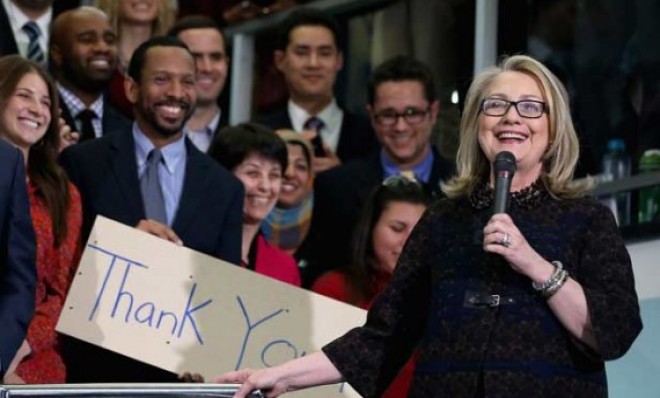Will Hillary freeze the Invisible Primary?
She is the 800-pound gorilla in a pantsuit


A free daily email with the biggest news stories of the day – and the best features from TheWeek.com
You are now subscribed
Your newsletter sign-up was successful
So Hillary Clinton is now a citizen in repose. The brief frenzy of 2016 speculation that accompanied the inauguration has died down, and thank goodness, because we're all supposed to hate presidential politics, and we're supposed to let the current president govern. The Invisible Primary refers to the period before the formal party primaries. During this period, candidates figure out if they want to run, recruit staff, decide how they want to run, recruit donors, and plan their campaign. It takes place behind closed doors, usually, with brief flashes of publicity only to ensure that the political reporting class dutifully begins to assess the candidate's seriousness and informal campaign apparatus.
These days, the Invisible Primary is quite visible. Political operatives acquire a celebrity; their movements are tracked as they feel out candidates. Political action committee disbursements are scrutinized; how much of the money is going to Iowa or New Hampshire? Whose loyalists get the most representation on the rules committee? Who was seen having dinner with the head of the AFL-CIO?
But this year, all that might just stop. The Democratic Party has two tiers of candidates. In order for the second tier of candidates to even conceive of running, then the first tier has to step aside. That first tier, of course, is occupied by Clinton. Her intentions are unknowable, but trust me when I tell you that, to the extent that the Democratic Party still has reliable donors and committed activists, the lion's share are hoping Clinton runs and are ready to endorse her immediately. She is the 800-pound gorilla in a pantsuit. No one moves until she does.
The Week
Escape your echo chamber. Get the facts behind the news, plus analysis from multiple perspectives.

Sign up for The Week's Free Newsletters
From our morning news briefing to a weekly Good News Newsletter, get the best of The Week delivered directly to your inbox.
From our morning news briefing to a weekly Good News Newsletter, get the best of The Week delivered directly to your inbox.
So if you're Martin O'Malley or Andrew Cuomo, what do you do? There's not much you can do. You can hire some staff; O'Malley just booked the services of Teddy Davis for "strategic communications." Davis knows the political world in and out. He will handle O'Malley's quiet outreach to reporters and others. (Disclosure: I helped hire him as an intern for the ABC News Political Unit a decade ago.) I assume that, at some point, O'Malley will reach out to Clinton to get a feel for whether any more public activity would offend her. Cuomo probably won't. He's too proud for that. But how he'll find donors in New York... I don't know.
One truth that none of the potential 2016 candidates will admit to is that they'd be willing to be Clinton's vice president. (Current veep Joe Biden is the exception. He's up or out.) That's why they have to tread carefully. They cannot risk offending the Clinton universe even if she were to lose the presidency in 2016 because they will need that apparatus, or a lot of it, very quickly for 2020. Never say never, but for the moment, no one is going to run for president the way Barack Obama did.
A free daily email with the biggest news stories of the day – and the best features from TheWeek.com
Marc Ambinder is TheWeek.com's editor-at-large. He is the author, with D.B. Grady, of The Command and Deep State: Inside the Government Secrecy Industry. Marc is also a contributing editor for The Atlantic and GQ. Formerly, he served as White House correspondent for National Journal, chief political consultant for CBS News, and politics editor at The Atlantic. Marc is a 2001 graduate of Harvard. He is married to Michael Park, a corporate strategy consultant, and lives in Los Angeles.
-
 The billionaires’ wealth tax: a catastrophe for California?
The billionaires’ wealth tax: a catastrophe for California?Talking Point Peter Thiel and Larry Page preparing to change state residency
-
 Bari Weiss’ ‘60 Minutes’ scandal is about more than one report
Bari Weiss’ ‘60 Minutes’ scandal is about more than one reportIN THE SPOTLIGHT By blocking an approved segment on a controversial prison holding US deportees in El Salvador, the editor-in-chief of CBS News has become the main story
-
 Has Zohran Mamdani shown the Democrats how to win again?
Has Zohran Mamdani shown the Democrats how to win again?Today’s Big Question New York City mayoral election touted as victory for left-wing populists but moderate centrist wins elsewhere present more complex path for Democratic Party
-
 Millions turn out for anti-Trump ‘No Kings’ rallies
Millions turn out for anti-Trump ‘No Kings’ ralliesSpeed Read An estimated 7 million people participated, 2 million more than at the first ‘No Kings’ protest in June
-
 Ghislaine Maxwell: angling for a Trump pardon
Ghislaine Maxwell: angling for a Trump pardonTalking Point Convicted sex trafficker's testimony could shed new light on president's links to Jeffrey Epstein
-
 The last words and final moments of 40 presidents
The last words and final moments of 40 presidentsThe Explainer Some are eloquent quotes worthy of the holders of the highest office in the nation, and others... aren't
-
 The JFK files: the truth at last?
The JFK files: the truth at last?In The Spotlight More than 64,000 previously classified documents relating the 1963 assassination of John F. Kennedy have been released by the Trump administration
-
 'Seriously, not literally': how should the world take Donald Trump?
'Seriously, not literally': how should the world take Donald Trump?Today's big question White House rhetoric and reality look likely to become increasingly blurred



